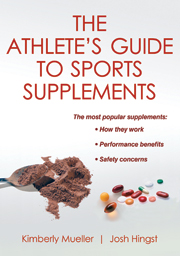

|
Back to Archive Index |
FEBRUARY 28,2013 Five Tips to Become a Supplement Savvy Athlete Dietary supplements are often perceived as band aids for poor lifestyle choices, including imbalanced nutrition, lack of exercise, and deficient sleep patterns. However, tales abound of people who took ill or died after using dietary supplements. A few weeks ago USPlabs, the developer and marketer of Jack3d, a powder containing a stimulant that marketers say increases strength, speed, and endurance, was sued by the family of a soldier who died after taking the product. The suit, which also includes GNC, which sold the product, claims that the companies deceptively marketed Jack3d as safe and effective while not warning consumers about its potential health risks. Federal regulations for dietary supplements are very different from those for prescription and over-the-counter drugs. A dietary supplement manufacturer does not have to prove a product's safety and effectiveness before it is marketed. You will soon be able to find information on safe and legal performance-focused supplements in a book written by Kimberly Mueller, a registered dietitian and board-certified specialist in sport dietetics, and strength and conditioning coach Josh Hingst. Their upcoming book is The Athleteís Guide to Sports Supplements (Human Kinetics, June 2013).  In the book, Mueller offers 5 tips that all athletes should follow when taking a supplement: 1. Talk with your health-care provider before making a decision. Be selective about where and from whom you gather information. Speak with a health-care provider, such as a doctor or pharmacist, about the potential benefits as well as safety risks of dietary supplements before taking anything. 2. Become familiar with reputable online resources for supplements. An online search of dietary supplements will likely lead to a plethora of often conflicting, usually unqualified information. A good place to start is the National Institutes of Healthís Office of Dietary Supplements, which includes publications (such as "Dietary Supplements: What You Need to Know") and fact sheets on a variety of specific supplement ingredients and products. 3. Look for clean supplements. Several reviews of supplements available from the Internet and retail stores have confirmed that many supplements are laced with steroids and stimulants, which are prohibited for use in sports. If you are thinking about using a dietary supplement, make sure an independent testing lab has proven that the contents actually match what is printed on the label, there are no ingredients that are not openly disclosed on the label, and there are no unacceptable levels of contaminants present. 4. Learn how to read supplement labels. A dietary supplement label lists essential information about the product. Always read the label and follow directions for use. 5. Know how to report fraudulent supplements or adverse reactions. If you experience an adverse reaction to a dietary supplement, immediately contact your health-care provider and make sure the problem is reported directly to the FDA. Itís impossible to ignore the prevalence of dietary supplement use in athletics. And there are legitimate reasons for an athlete to use supplements in coordination with a well-balanced diet, says Mueller. Itís up to you to educate yourself about supplements and use them safely and wisely. |
|
|
|
Disclaimer and Copyright · Site design by Marketorial.com
|